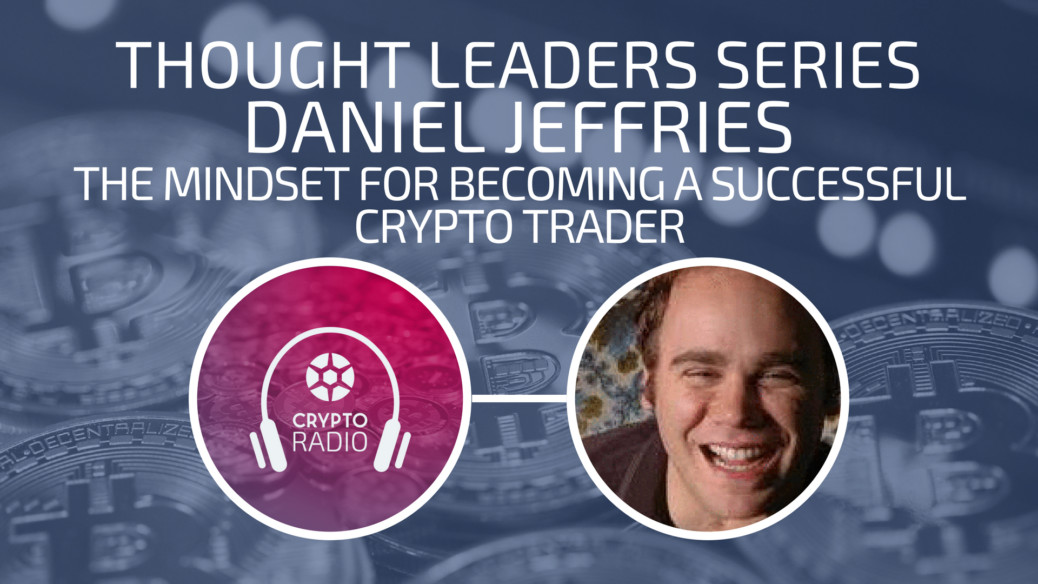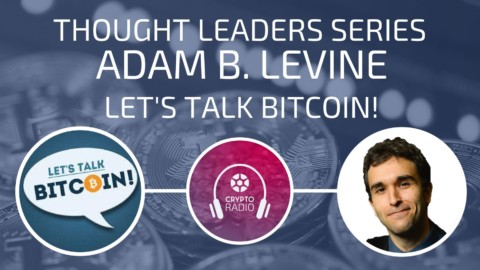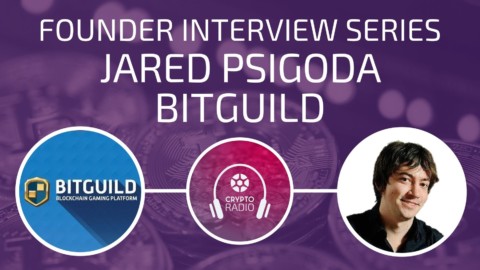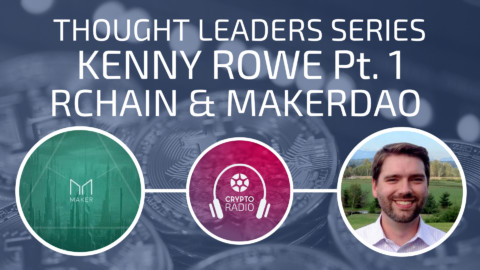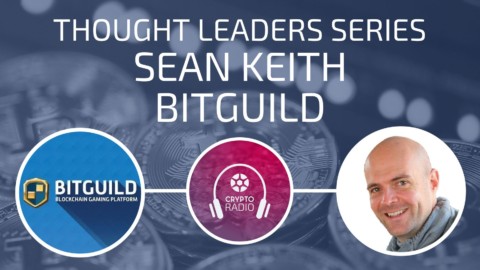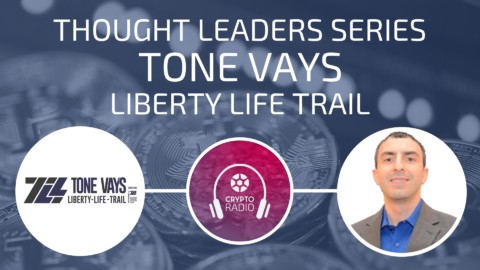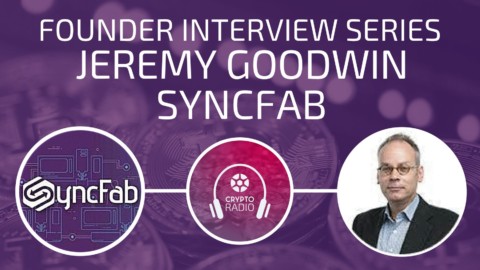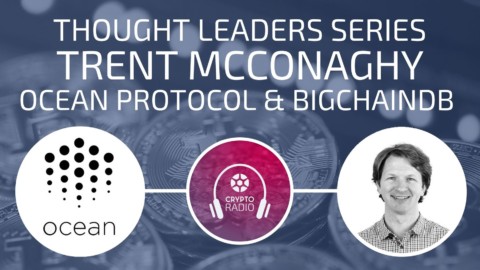Podcast: Play in new window | Download
Euvie: Hi crypto world. This is Euvie Ivanova. Welcome back to the thought leader series on Crypto Radio. Today my guest is Daniel Jeffries, author futurist, engineer, and serial entrepreneur. Daniel has published a number of popular articles on Medium on blockchain, cryptocurrencies, AI, and philosophy. He’s also recently launched the Daily Post human podcast. This interview comes out in three parts, since there’s always lots to talk about with Dan. In part one, [00:00:30] we talk about the strategies for becoming a good crypto trader, which are often counterintuitive to our normal behaviour.
For all the links and resources from this episode go to cryptoradio.io/daniel1. You can hear the second and third parts of this interview at cryptoradio.io/daniel2 and cryptoradio.io/daniel3 once they become available. This episode was brought to you by bitguild.io. Bitguild is a new gaming platform built using blockchain technology. [00:01:00] Their mission is to redefine the relationship between gamers and game developers. On the Bitguild platform gamers maintain full ownership and control of their virtual items, which are stored on the blockchain. They can transfer items and progress between compatible games and they can make in game transactions safely and cheaply, and sometimes free.
Developers who join the platform will get a direct link to an established player base, a strong community, and a network of like minded developers building on the same platform. Developers [00:01:30] will also have the potential for direct game development funding from Bitguild. The first version of the Bitguild portal is now. You can login with Meta Mask, buy the Plat token, and play Bitguild’s first game, Ether Online. They now have a full inventory wallet system for in game items. In the coming weeks, the marketplace will be implemented and several independent developers are joining the site to bring their unique games to the Bitguild family. Go to cryptoradio.io/play to start playing and join the Bitguild official Discord [00:02:00] server to connect with the team.
Mike: Welcome to Crypto Radio. We interview the top thinkers and entrepreneurs in the blockchain and cryptocurrency industry. We also cover topics like trading, investing, and ICOs. We’re your hosts Mike Gilliland, Michael Paul, Chris Sparks, and Euvie Ivanova. We’re entrepreneurs, crypt investors, and co-founders of a new blockchain investment platform called cosyndicate.io. We created Cosyndicate and Crypto Radio to make crypto investing a better experience for you. If you’re new to the show [00:02:30] and you’d like a list of our top episodes and resources, go to cryptoradio.io/start. If you like our podcast, you can subscribe, share, and follow us on social media and leave us a rating and review on iTunes and elsewhere. It helps others find the show and we really appreciate it. You can find all those links at cryptoradio.io/start.
Euvie: Hey Dan, welcome to the show.
Daniel: Thank you so much for having me.
Euvie: Today I wanted to chat about some of your crypto trading strategies [00:03:00] so you could offer our listeners some of your best wisdom that you’ve learned over your time trading crypto. Not just in terms of technical stuff but also in terms of mindset and psychology and things like that.
Daniel: Sure, I’d be happy to do so.
Euvie: Maybe we could talk about we’ve been experiencing a bit of a bare market or sideways market recently and in an upwards market everybody is a genius trader, but when the market is going down or sideways or stagnating, [00:03:30] people tend to lose their enthusiasm or just don’t know what to do. What are some of your best strategies that you’ve learned for dealing with times like this?
Daniel: This is a very interesting time because it’s easy for people to lose their enthusiasm and they get addicted to the action of the market. The market is nobody’s personal ATM, it is not like getting a salary where you are [00:04:00] constantly getting a consistent payout. It doesn’t work like that. Money in the market is made in bunches and it is lost in bunches and there are a ton of times when it’s a lot like watching the grass grow. Investing is really boring. Trading is really boring when it is done correctly. It is not about winning [00:04:30] like you’re winning in Vegas, it is not about the rush.
This type of market shakes out a lot of the pretenders and, frankly, that is a good thing. This is where I try to teach my followers and my patrons how to think about the world more clearly. There’s a mindset of being able to see reality as it actually versus [00:05:00] how you imagine it to be. Last night I held my monthly meetup with my patrons and the first thing I talked about was dealing with a crisis situation – whether that’s in trading or in your life. one of the things I’ve noticed is there’s a simple technique to get yourself into a better place. The first step is to breathe, the second step is to [00:05:30] do absolutely nothing, just listen. The third is to wait for a clear signal and then take direct action. I’ll talk about what each of those mean.
Breathe is to be understood on multiple levels. There is taking a pause when things are going wrong, taking no more action. There’s also really an effective breathing technique, which is breathing from the belly [00:06:00] as opposed to breathing from the chest. Breathing from the chest creates fear, breathing from the belly creates calm. We’re not taught this in life or in school and it seems trivial, it seems new agey or gimmicky but I assure you it is not. Taking deep breathes from the belly, just pushing your belly out like a giant fat man is incredibly useful. The second part is we don’t have a single mind, [00:06:30] we have a cacophony of voices in our mind. When we are under stress, it’s like an argument in congress; everyone is yelling at each other and screaming, there’s anxiety, there’s fear, there’s uncertainty.
The instinct is to take some kind of action. In fact, in society we prize people who just take a quick action when there’s a crisis. That is insane, it’s literally insane and it is not how things work. [00:07:00] The best thing to do is to not get attached to that swirling cacophony, to listen quietly, take that breath, let the storm pass, doing nothing and listening. Eventually, the storm plays itself out, it clears itself out. The emotional storm, the mental storm clears itself out and you can begin to hear clearly what’s next. What’s next [00:07:30] might be a particular trade, it might be something that you need to take a pause from the market for several weeks and do nothing. There’s a clear voice at the end of this process that lets you know what to do definitively.
That’s what I try to teach my folks and it’s something I try to live by. One of the fellows asked me about the market and he said that he was, because it was a sideways market [00:08:00] or a challenging market, he was spending a lot more time in front of a screen and it was causing a lot of stress in his life for very little return. I told him that was a natural instinct and, in fact, trading is doing the exact opposite of your natural instinct. What you need to do is spend less time in front of a screen, you need to spend [00:08:30] more time away from the screen. I encouraged him to close his trades if he could, to take a breath, take a pause, try to reflect on the things that he was doing, understand why he felt the need to continue to trade when it was going poorly, and to focus on one or two trades and make them with careful consideration.
Then [00:09:00] make a decision in a short period of time, set your stock and walk away and don’t look at it. Know your plan. If you have an effective plan, then you can effectively trade. If you know when you know you’re going to get in, what your stock is going to be, when you’re going to move your stock, when you’re going to close your position, when you’re going to exit because it went against you. If you have that clear plan, you can make a clear [00:09:30] decision. When I place my trades, I place them and make my decision in five minutes or less. I place them, I get out. I might move my stocks one or two times a day. I do my best not to continually look at the market.
When I find that I am continually looking at the market, it’s generally because a successful period started to go against me, I might face some [inaudible [0:09:55] or two or three trades start to get knocked out [00:10:00] and I start feeling that pull to stare at the screen all day, I can deduce the mystical understanding of the market if I just stare at the stupid thing bouncing around all day – as soon as I do that, I’ve trained myself to have the little voice in the back of my mind that says, “Get the hell away from the screen.” I close my positions as quickly as possible and I step away for a few days.
Euvie: I guess if we think about the market as a reflection of the psychological [00:10:30] sentiment of millions or billions of people who are all irrational and emotional and make stupid decisions constantly or just are newbies and don’t know what they’re doing, then you could see that the whole market, there’s nothing solid to it in a way. It’s just reflecting the sentiment of all these people. If you’re just following those same instincts, you’re going to be making the same mistakes as everybody else and you’re [00:11:00] just going to fail by default. I can’t remember where I saw this but I think it’s pretty obvious trading wisdom that, when everybody’s elated and in seventh heaven, that’s the time to get out. When everybody says, “Okay, it’s over, crypto is dead,” that’s the time to buy.
Daniel: That is not a bad [inaudible [0:11:18] or rule to think about. I think there’s a book called Super Stocks, which is my favourite trading book of all time. This is a gentleman Jesse Stein who made [00:11:30] 20,000 percent return in the regular markets in a few years. A very intelligent and successful fellow. He has an entire chapter on selling. He talks about six or seven times that he made a fantastic trade, watched it rocket up 700 percent, 1,000 percent and started strutting around like he was a genius, planning trips, talking to his friends, then it would [00:12:00] tank on him and he would desperately cling to it while it crashed on him. He went through this about six times before he finally figured out a series of rules for selling.
He has some hard and fast rules and I would encourage everyone to read it. Unfortunately, it’s not on kindle, it’s only a hardcover but it is worth every penny. One of the rules he talks about is when you start thinking you’re a genius and [00:12:30] nothing can go wrong and you have six sense of the market, sell everything immediately. I can’t tell you how many times I’ve experienced that myself. Sometimes I listen to it and sometimes I don’t. When I don’t, every single time I’ve paid the price and I think everybody experiences that.
Euvie: Yup.
Daniel: Of course, right. Actually, one of my more popular tweets was that the path of legendary trailer and I had an article about it. [00:13:00] It was really like eight steps, the equal path of the trader. One of them was basically starting off clueless and then trading too much, breaking every rule, ignoring them, not setting stops, then just taking a massive loss. Everybody does that and that’s kind of where most people tap out and quit. A good trader, a professional trader’s going to learn from that pain. They’re going to make their main their motivation and they’re going [00:13:30] to go ahead and figure out what they were doing wrong, then they start looking back at the ancient wisdom, at the old traders, trying to understand what they did.
They start to realize portfolio management matters and setting your stops matter. They start to follow the rules and then they become experts in those rules, they begin to iterate on those rules. They stop listening to the [00:14:00] news, they stop paying attention to others, they start to develop their own style eventually and I think that’s the path for mastery in anything in life. There’s the book Mastery by Robert Green that talks about that. He had written the 48 Laws of Power which I’m not a tremendous fan of, I know a lot of folks are. I did like Mastery very much, that was given to me by one of my students. I’ve enjoyed it. It’s probably because it fits with a path that I’ve already gone down myself and so I’m just recognizing it as true.
[00:14:30] I think it’s helpful for folks who have not experienced the highs and lows. Another book that talks about that is Market Wizards and the follow up New Market Wizards, where there are interviews with these legendary traders. Inevitably, they talk about the big loss or the big win. The big loss is usually the one that teaches them a very hard lesson. I think it was [inaudible [0:14:47] Jones is an incredible trader who was a [00:15:00] commodities trader at the time and he remembers being in the pit and placing a massive trade for cotton and somebody came across to offer him more and he bought it like a macho man.
Then somebody came running across the pit saying that they had taken his and they were selling – they were selling, selling, selling. He realized in a split [00:15:30] second that the guy running across the pit was from the team that actually owned the delivery contracts. In commodities there are two types of contracts. There are contracts where you are just trading cotton but you don’t actually have any cotton and then there are the ones that you actually have a warehouse full of cotton and you’re selling it and those are the big whales in that space. The guy who was running across the pit was the guy who had all the cotton and he was dumping on him instantly.
Euvie: Oh my God.
Daniel: [00:16:00] Everybody turned and looked at him all at once and he realized what happened. He walked away, cleaned himself up, splashed water on his face, went to the bathroom, came back, and started selling. He took a big loss, actually, he took a massive loss but he was able to at least get out of the position and he learned very quickly that you just don’t play macho man with the market, you just don’t pretend that you’re the hero slaying the giant dragon and that you know everything. All of these mythologies [00:16:30] about the market are just totally and completely wrong, totally wrong. When I talk about turtle trading, William Eckhart, who is one of the leaders of the turtles along with Richard Dennis. William Eckhart was the [inaudible [0:16:45] mathematical mind and Richard Dennis was more of the gunslinging commodity trader.
William Eckhart said there were two rules: in life we basically are trained to [00:17:00] fight through all adversity – it’s our hunter gatherer mindset where, when you find those bananas, you might not find them again, so you better eat them as fast as possible. When everything is going wrong, you just endure – humans are survival machines. Really, the exact opposite is true in trading. You have to run like hell from adversity and you have to do absolutely nothing [00:17:30] when things are going well for you, you have to sit idly by and let those profits run. When you’re facing adversity, you need to cut your losses immediately and run like a total coward. That is just the complete opposite of how things work in the real world but that is how things work in the market.
Euvie: Right. Relates to what we were talking about before, that the smart way to win the market is to go [00:18:00] against your natural instincts or your natural psychology.
Daniel: You must be a contrarian, you must think differently than the masses or you have no success. There’s no chance, it’s absolutely necessary.
Euvie: Even something that you touched, as well, the idea that there’s some sort of secret or secret wisdom that, if you only knew it, you would instantly be a master trader. That also relates [00:18:30] to everything in life – people want three easy steps to having fantastic six pack abs or to getting a supermodel wife or whatever, but it doesn’t work like that. You have to spend years learning and perfecting something to be good at it and there are no secrets actually. There might be some tricks that you can learn but then you still have to know how to apply them.
Daniel: You’ve just broken my heart, there’s no five easy steps to supermodel wife. That’s [00:19:00] really disheartening. The most popular articles on Twitter are still the lifehack articles – five steps to getting the six pack abs or 30 things to do before breakfast. Nobody does fucking 30 things before breakfast, nobody does two things before breakfast. It is a lie, it is snake oil. It goes back to some of our philosophical discussions in the past, which is relevant here, and that is [00:19:30] when you want to believe that you can have something for nothing, there are many, many people out there who are willing to sell you that dream in countless different forms. A lot of the new age literature, a lot of religious literature, a lot of self-help guides are really about, “Hey, you don’t have to do a damn thing. Just keep doing what you’re doing, maybe meditate a little, maybe pray to the Great Gazoo, [00:20:00] whatever it is. Stay right where you are. Change nothing, don’t ask questions, right, don’t make a ruckus and everything will be great.” The exact opposite is true.
The ancient secret finally revealed is one of the greatest scams in history. It’s wonderful, it works every time on people who don’t want to do anything. It’s so comforting to feel like all you need to do is find this one trick [00:20:30] and suddenly everything will work smoothly in your life. If there is an ancient secret, it’s that there is not secret, right. You remember the end of Kung Fu Panda when he gets the secret scroll and the bad guy, the tiger, looks at it and he’s like, “There’s nothing on here. This is useless, the whole thing was a scam. Kung Fu is a scam, my whole life is a scam.” That’s because he is selfish and lazy and he wants to be [00:21:00] the dominant force, he sees everything as a win and a loss, he is vicious, he is ignorant.
Kung Fu Panda sees it and sees that the secret ingredient is you, there is not secret. He understands the true ancient wisdom. That is it. That is the true ancient wisdom. That is that you have to do something, you have to work. The process is the same for anything. It’s a process of being totally confused [00:21:30] and wanting to run away and quit and not understanding what’s happening, not understanding the language, not understanding what you’re seeing, not understanding what people are talking about, what you’re reading. Then apprenticing yourself, learning the different skills and then starting to understand some of the bits and move them around. You get to a conscious competent stage, if you think about it with your logical mind, right, you can get there but you can’t [00:22:00] really work it at the intuitive level or the unconscious level.
Then you pass a different point where the tools start to become your own, the keyboard is an extension of your fingers, the surfboard is an extension of your feet, the trading signals are an extension of your mind and you’re understanding them at a much deeper level – like a quantum level. You’re able to make them your own. These have all one thing in common and that’s [00:22:30] really your own personal willpower as well as consistency and time. In other words, every single day working at something a little bit, getting a little bit better, learning a little bit more Kung Fu. When I talk about my writing and people are very excited about my blog on Medium, they come to me [00:23:00] and say, “I love your writing, how did you get that way? I don’t have the time. It’s taking so long.”
A lot of young writers come to me and I say, “It only took me 20 years to become an overnight success.” There were just many years where I wrote and nobody wanted to hear a word that I was saying. You know why? I wasn’t any good yet. It’s as simple as that. I thought I was good, [00:23:30] I thought I had something to say. Somewhere in there I did. A core of what I was trying to get to was good but I still couldn’t express myself perfectly. Only through the patient practice of doing something over a long time do you get good at anything. That is the way of all things in life. That is, I guess, the ancient secret. It’s the one secret that nobody wants to hear. They will sit there and [00:24:00] consume 50 articles on 20 ways to hack your life with this shortcut and do nothing. If they had just invested that time in not reading those articles and actually doing the thing that they want to learn, then they would be so much further along.
Euvie: The point about the trading tools becoming an extension of your mind, it reminds me of an article that I posted recently about the spider outsourcing cognitive tasks [00:24:30] to the spiderweb where the mind of the spider is not confined to its brain. It talks about the ways that it works as if it’s so unique, but actually humans do this to an even larger extent. If we get over this idea that the mind is confined to the brain – and I know that, for most people, that’s quite an esoteric idea that they can’t really wrap their heads around. If we think about the mind not being confined to the brain, then it opens up the [00:25:00] possibilities like crazy.
Then you start recognizing that everything in your environment that you use and every piece of knowledge that you use is an extension of you mind, it is actually a part of your mind. If those parts are atrophied or if they’re poorly developed or if you are not aware of them, then you can’t really use them. It’s like a little baby that hasn’t figured out how to move its arms properly. [00:25:30] It’s the same thing, it just takes practices, it just takes years of practice. How to, first of all, find those things, recognize that they’re there and then learn to use them.
Daniel: Yeah, all of these things that we’ve developed throughout history are iterations and building blocks building on the last invention that make it easier to think and do things in a formal way. The invention of mathematics, the invention of the slide [inaudible [0:25:58], [00:26:00] the invention of the calculator. These progressive steps. Each of these tools allow us to do something in a consistent fashion that we don’t do as well with our mind. These tools are an extension of us. Whether you think about it in the wonderfully esoteric way that you put it or whether you just think about it in a very simple pragmatic way, if you aren’t bent [00:26:30] towards the spiritual or towards the esoteric way of thinking about it, it’s still relevant. These tools extend our capabilities as humans.
They are early augmentations. When we think about perhaps science fiction or something like that, we think about augmenting a human body or a human mind with a computer or a prosthetic device, that’s really just the extended process of something [00:27:00] that has been going on for millennia, something that’s been going on for thousands and thousands of years. When you build a stone tool to dig into the ground or you build a hammer and a nail – I talked about this at the rise of AI conference in Berlin – a hammer and a nail are really a form of automation. It is a way to construct something in a consistent and predictable fashion. Before that you had to go find [00:27:30] a bunch of twigs to rope things together, it was an imperfect process.
Or, you had to go and find a bunch of mud to stick together your thatched hut. When you have a hammer and nails, now you can begin to put structures together in a very consistent, predictable fashion. You can begin to build multiple levels within the housing structure or the structure that you’re building. [00:28:00] Eventually, as the materials develop, you can then build higher and higher layers to the point where a stone mason’s come into the picture, where different types of putting together large curved structures come together and you’re suddenly building temples and things like that.
Each of these things is a progression and the best thing you can do is understand the tools of your time, because they are basically like leverage. I don’t mean leverage in the trading [00:28:30] sense but leverage in terms of the pully sense or in terms of the long bar. If you’ve ever tried to pick up something really heavy, if you’ve ever done this science experiment when you were a kid in school and you try to lift it with your pure brute force, a big rock or something, or a big box and you can’t do it, then your science teacher gets out a long rod with a piece on the end and sets up a fulcrum in the middle and [00:29:00] you put that under the box and you just press on it with one hand and the box starts to come up. That’s leverage, that’s the power of leverage. What all these tools are is leverage and an extension to mitigate the weaknesses of the human mind and to extend the great benefits or the strengths of the human mind.
Euvie: Yeah. If we think about these things in the same way, you could see the benefit of learning one tool at a time [00:29:30] or maybe just a couple tools at a time, instead of trying to be good at all at once. Sometimes when people enter a new discipline, they don’t really know what to focus on and they’re just trying and testing everything. That’s fine, to get your bearing on things, but I do think there is a lot of value in focusing on a couple things at once, or even one thing at once, and then mastering that to some reasonable degree and then moving on to another thing.
Daniel: I think it’s true, [00:30:00] I think in the beginning it is play and you are looking at a lot of things. I do think it’s part of the process, because you don’t really know what tools are valuable. You’re listening to other folks telling you, “You got to learn this and you got to learn this.” You look at it and you try to figure out why it’s valuable. There is a moment of clarity or understanding that starts to dawn in your brain when you are looking at prints like an indicator. I think there was a moment where [00:30:30] early on I think in one of my articles I had been hot on [inaudible [0:30:36]. I kept looking at it and it just never consistently performed. For a long time, I couldn’t quite rectify that with what I was seeing. Some good traders had told me it was a useful tool, so it must be a useful tool.
In fact, maybe it is a useful tool but the more I looked at it, the more I started to realize [00:31:00] it doesn’t seem to be useful for me, it doesn’t seem to give me any kind of insight into the market. Eventually, I just put it down, I started to look around for other tools, focus on other indicators, other things that gave me a better and clearer picture of what I was trying to achieve. I think it’s almost inevitably part of the process, that you try lots of things [00:31:30] because you really don’t know what the hell you’re doing whenever you start something.
Daniel Jeffries talks about the best mindset for becoming a successful crypto trader.
Daniel Jeffries is an author, futurist, engineer, and serial entrepreneur. He has published a number of popular articles on Medium on blockchain, cryptocurrencies, AI and philosophy, and has also recently launched the Daily Posthuman podcast. This interview comes out in three parts, as there is always a lot to talk about with Dan. In Part 1 we talk about the necessary mindset for becoming a good crypto trader.
What we cover in this episode:
- Developing the ability to see reality as it actually is instras of how we imagine it to be
- A simple three-step technique for dealing with any crisis situation, in trading or in everyday life
- Why good trading is often counterintuitive to normal human behavior
- The importance of transforming pain into motivation, as a path for mastering everything in life
- The truth about “secret techniques”
- The three requirements for entering the conscious competence stage in trading
- Reframing tools as extensions of our mind
Mentions and Resources:
- Daniel Jeffries on Medium
- Daily Posthuman podcast
- The Thoughts of a Spiderweb, an article by Joshua Sokol
- Insider Buy Superstocks, a book by Jesse Stine
- Market Wizards, a book by Jack Schwager
- The New Market Wizards, a book by Jack Schwager
- Paul Tudor Jones, the famous trader
- Crypto Radio’s Thought Leaders Series

